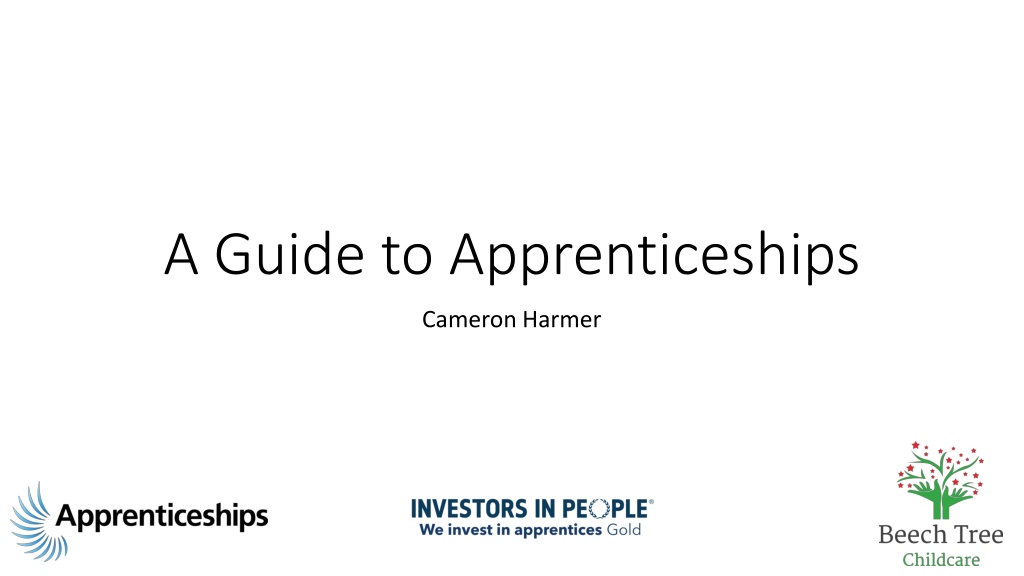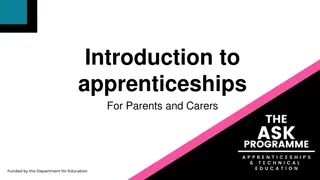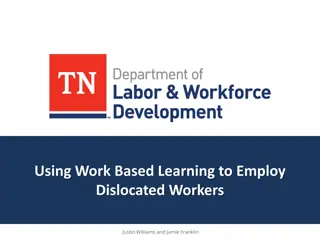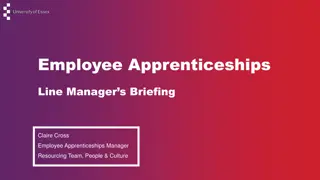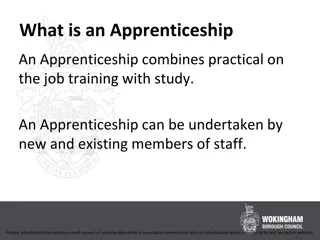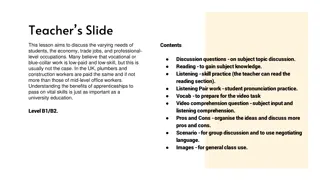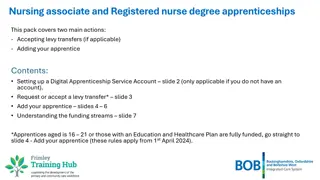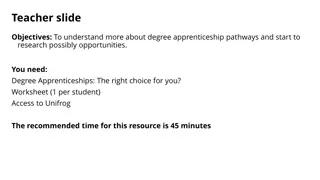All About Apprenticeships: A Comprehensive Guide
Apprenticeships offer hands-on experience, a salary, and the opportunity to train while working, with at least 20% of time dedicated to off-the-job training. Various apprenticeship levels are available in different industries, and anyone over 16 in England can pursue one. Training providers play a crucial role in supporting apprentices throughout their programs.
Download Presentation

Please find below an Image/Link to download the presentation.
The content on the website is provided AS IS for your information and personal use only. It may not be sold, licensed, or shared on other websites without obtaining consent from the author. Download presentation by click this link. If you encounter any issues during the download, it is possible that the publisher has removed the file from their server.
E N D
Presentation Transcript
A Guide to Apprenticeships Cameron Harmer
What is an Apprenticeship? An apprenticeship is a real job, with hands-on experience, a salary and the chance to train and gain qualifications while you work. You are treated just like all other employees, with a contract of employment, a salary and holiday leave. You are given real responsibilities. You will spend at least 20% (equivalent to 1 day a week) of your time completing off-the-job training, often at a college, university or with an independent training provider. You will train to be fully competent in your chosen occupation.
My Apprenticeship Story Cameron Harmer 2017 - Apprenticeship 2019 - University 2022/3 Further Education Abbie Titchener 2020 - Apprenticeship 2021 Almost finished 2023 My future
How will I study as an apprentice? In apprenticeships, this is called off-the-job training and should equate to 20% of your time. Your off-the-job training will be completed within your paid hours and will fit around the job commitment and needs of the business. There are different ways that off-the-job training can be delivered. It could include: Once a week (day release) In blocks of a week or more at scheduled times (e.g. a week in September) Studying online A combination of the above Your employer will select the apprenticeship training provider that will support you with your programme
Which apprenticeships are available? There are thousands of apprenticeships in different job roles and industries. Each apprenticeship will also have a level attached to it. The four levels of apprenticeship are:
FAQ Who can do an apprenticeship? Anybody can do an apprenticeship, as long as you are 16 or over, living in England and not in full-time education. How long does an apprenticeship take? It usually takes between 1 and 4 years to complete an apprenticeship, depending on which level you do. Who is the training provider? The training provider provides the off-the-job training, but they also have a key role in assessing your progress towards achieving your apprenticeship and ensuring that you feel supported. There are lots of different organisations that are registered as training providers and could include: - Independent Training Providers - FE Colleges - Universities - Employer providers
Entry requirements Each apprenticeship vacancy will specify the entry requirements and skills or qualities the employer is looking for. Entry requirements can vary between different employers. Some employers might ask for GCSEs, others will ask for A Levels and some will ask for no qualifications at all. As well as entry requirements, employers will be looking for how you will fit in with the organisation and for your passion and interest in working in that job role
What will I be paid? Legally, an employer must pay an apprentice the National Minimum Wage for apprentices, which will rise to 4.15 in April 2020. This is lower than the normal National Minimum Wage, but it recognises that some people will be going into their first job with no experience at all. To read more about the National Minimum Wage At Beech Tree Childcare we pay apprentices 5per hour raising to 9 at 18.
What are the benefits of an apprenticeship? Job ready Through apprenticeships, you will learn the skills and knowledge that your employer feels are the most relevant to your job role, making you more competitive and employable Paid while you learn You earn a salary and do not have any fees or debt for training and tuition. This gives apprentices financial independence. Gain professional accreditation Some apprenticeships also allow individuals to gain professional accreditation, which is an industry-wide qualification or certificate that demonstrates that you have the experiences, as well as the qualifications, to do that job role.
What are the benefits of an apprenticeship? Experience You have transferable experience and skills, having worked on real projects and tasks in a business environment from day one. You are immediately immersed in your industry, learning industry-specific skills and an understanding of its priorities and landscape. Support Your support network as an apprentice is vast, with your employer, colleagues, apprentice colleagues, training provider and many other networks providing both personal and professional support Networking Not only are you learning from experts and professionals within your organisation, but you will have opportunities to meet other professionals in the industry
What are the benefits of an apprenticeship? Long-term career Having so much practical experience, apprentices can often quickly progress through their organisation or industry, with many having moved on to manage their own teams of apprentices or becoming Directors of their organisation
Employers love apprentices! Employers now favour relevant apprenticeships or experience over university degrees, a survey has found: A survey of 1,000 decision makers found 49 per cent prefer to see experience from a relevant apprenticeship or previous position on a candidate s CV. Just 24 per cent said they would be more likely to take on someone who had a relevant degree qualification. Of those who said they prioritise candidates who have relevant experience from an apprenticeship or previous job, 71 per cent said they prefer it because it shows they have demonstrated their skills in a practical setting. 62 per cent said it indicates they have a better understanding of the world of work.
How do I apply for an apprenticeship at Beech Tree Childcare? Email enquiries@beechtreechildcare.co.uk CV 500 words about why you want to work in Early Years Education and your passions and interests The Process Phone Interview Face to face Stay and play Final interview
